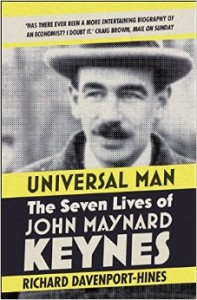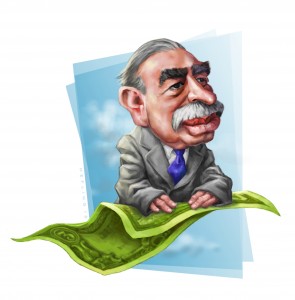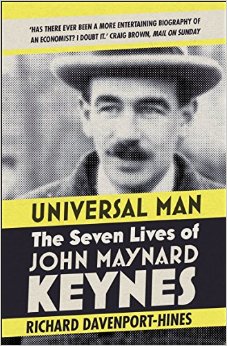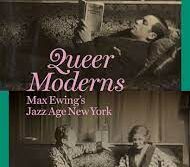 Universal Man: The Lives of John Maynard Keynes
Universal Man: The Lives of John Maynard Keynes
by Richard Davenport-Hines
Basic Books. 432 pages, $29.99
JOHN MAYNARD KEYNES would not make a great Hollywood protagonist, at least based on Richard Davenport-Hines’ biography. It’s hard to identify a breakthrough moment, any dramatic shift, in the life of the most important economist of the first half of the 20th century. He seems always to have been brilliant and charismatic. Things came easily to him, as well they might to a superbly educated English gentleman, and things seemed to go his way. No less an intellect than Bertrand Russell remarked that “Keynes’ intellect is the sharpest and clearest that I have ever known.”
Keynes has been the subject of several biographies, including Robert Skidelsky’s three-volume effort in 1983. In contrast to Skidelsky’s approach, Davenport-Hines is less interested in producing a faithful narration of Keynes’ life than a lifelike portrait by broad theme. The Keynes that emerges merits attention for more than his economic theories, which are gone into only lightly here. He was a government official and adviser to prime ministers and treasury secretaries; a syndicated columnist, the editor of the New Statesman, and the writer of The Economic Consequences of the Peace, a 1919 bestseller that criticized the Versailles Treaty; an unapologetic gay man who ended up marrying a woman; an art collector who orchestrated the National Gallery’s purchase of Edgar Degas’ private collection after his death in 1918; and a diplomat who secured concessions from the U.S. for the repayment of British debt after World War II.
Keynes received the best education on offer. His eager parents took their son to sit for a competitive exam to Eton, and the son dutifully delivered, winning a scholarship to the otherwise aristocratic high school. Next, he was back in his hometown of Cambridge, now a top student in classics and math at King’s College, with which he would maintain a life-long association. He was introduced to economics by the great Alfred Marshall, a friend of his father’s under whom he studied the subject informally for eight weeks as a diversion from his course of studies. “I find Economics increasingly satisfactory, and I think I am rather good at it,” he told a friend. But what he had in mind was not theory but business administration. “I want to manage a railway or organize a Trust or at least swindle the investing public. It is so easy and fascinating to master the principles of these things.” After college, he turned not to graduate school but to government service, an affiliation that continued on-and-off until his death in 1946. He came in second out of 104 candidates in the civil service entrance exam and chose the rather relaxed but still prestigious India Office, where slack working hours—11 a.m. to 5 p.m. on weekdays and to 1 p.m. on Saturday, with an hour for lunch—provided opportunities to write a book on probability and to engage in fierce intellectual discussions on morality, æsthetics, and sex in the Cambridge Apostles, a selective secret society, and in the Bloomsbury literary group in London. A sense of Keynes’ personal life comes through the hefty chapter on his sex life. One consistent feature is that he was, including by his own admission, physically unattractive. He compensated by turning on his considerable charm, and to excellent effect. He was always quick to establish a personal connection, not least with some of the period’s most influential people. “I had a little flirt with him,” he wrote about his encounter with Albert Einstein in Berlin in 1926. Keynes boasted a busy love life, starting in high school. His male lovers were of two kinds. With university friends and other social peers he sometimes had long-term relationships, often not without an element of drama, such as when he dated his ex-boyfriend’s ex. The second group consisted of hook-ups with men of every rank, shape, and age, men that he hit on everywhere or met in pick-up spots. Ever the fact-loving empiricist, he recorded his sexual encounters meticulously. After a handful of entries in his early twenties, his annual activity peaked at 65 sexual encounters when he was 25, then subsided to around half that in subsequent years. Davenport-Hines has compiled a partial list of Keynes’ subject headings, which also give us a sense of his extensive travel across Europe: Stable Boy of Park Lane, The Swede of the National Gallery, The American of Victoria Street, The Sculptor of Florence, The Baron of Mentone, The Soldier of Baths, The Bootmaker of Bordeaux, The Art Dealer on the Quays, The French Conscript, The Shoemaker of the Hague, The young American near the British Museum, The Young man in the Park, The Medical Student, The beautiful young man in the P. shed, The clergyman, The Chemist’s boy of Paris, The Irish Nobleman of the White-chapel Baths, The Blackmailer, The Actor of Whitechapel, Sixteen year old under Etna, Lift Boy of Vauxhall, Jewboy, Grand Duke Cyril of the Paris Baths. The backdrop for his healthy sexual appetite was a society with serious hang-ups about sex. In a late Victorian fashion, Keynes was circumcised as a child, apparently to discourage masturbation later in life. Oscar Wilde’s recent imprisonment was a constant reminder that anti-sodomy laws were still on the books. But Davenport-Hines offers a more nuanced picture of the period’s mores, especial those of the elite. Social constraints produced a thriving underground scene. The London police’s occasional crackdown on male prostitution notwithstanding, Keynes and his fellows in the corridors of power don’t seem to have been especially secretive about their passions. In 1938, Keynes was amused when New Statesman, of which he was chairman, was criticized for running personal ads for men “not interested in the fair sex.” Earlier, at 27, Keynes came out to his mother and sister. “I had a dreadful conversation on Sunday with my mother and Margaret about marriage, and had practically to admit to them what I was! How much they grasped I don’t know.” Like some other gay men in his circle, he eventually married a woman—at age 42—Lydia Lopokova, a Russian ballerina. Davenport-Hines suggests that this was a rapport of love, companionship, and some sexual intimacy. The couple tried but failed to have children. At 53, in 1936, Keynes published The General Theory of Employment, Interest and Money, which revised classical economics in the great British empiricist tradition. Davenport-Hines, a British historian and biographer, gives little space to economic theory. Yet there is a subtle case about economics to be made. What makes a great economist? asks the author. Keynes himself provided an answer in an obituary for his teacher Alfred Marshall: “The master-economist must possess a rare combination of gifts. He must be mathematician, historian, statesman, philosopher—in some degree. … He must be purposeful and disinterested in a simultaneous mood; as aloof and incorruptible as an artist, yet sometimes as near the earth as a politician.” By inference, Keynes must be describing himself here. What a book like Universal Man does is to show that Keynes was a great economist because he was so much more than that. Yoav Sivan is an Israeli-American journalist based in New Jersey. Keynes’ background and upbringing help to explain his confidence and ambition. Born in 1883, he was a child prodigy who received encouragement from his upper-middle-class parents, both college-educated Baptists in the first generation after the Church of England loosened its grip on higher education. The father, a Cambridge economist and a university administrator, provided stability; his mother, a pioneering politician who was elected mayor of Cambridge in 1932, provided the inspiration.
Keynes’ background and upbringing help to explain his confidence and ambition. Born in 1883, he was a child prodigy who received encouragement from his upper-middle-class parents, both college-educated Baptists in the first generation after the Church of England loosened its grip on higher education. The father, a Cambridge economist and a university administrator, provided stability; his mother, a pioneering politician who was elected mayor of Cambridge in 1932, provided the inspiration.





